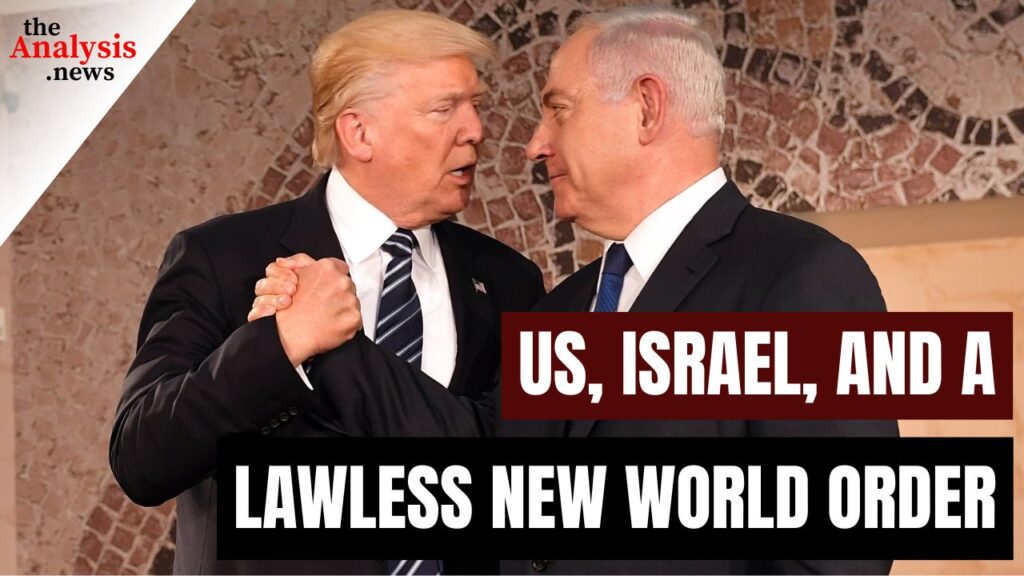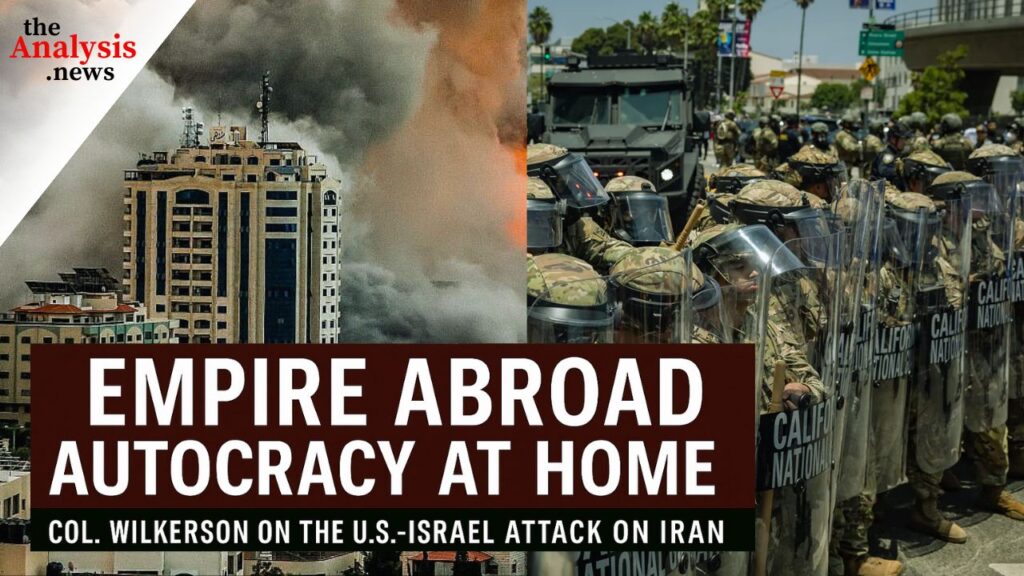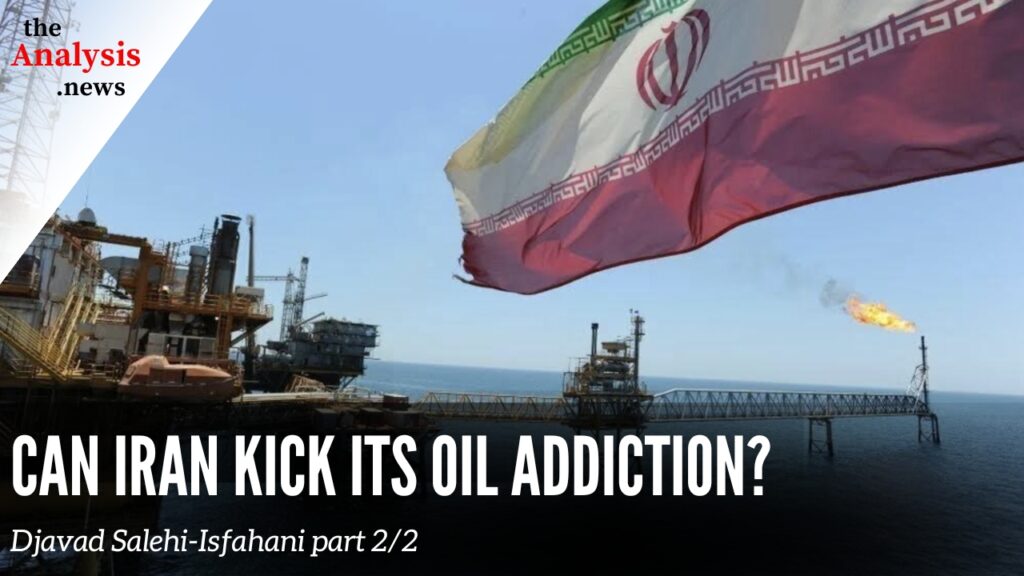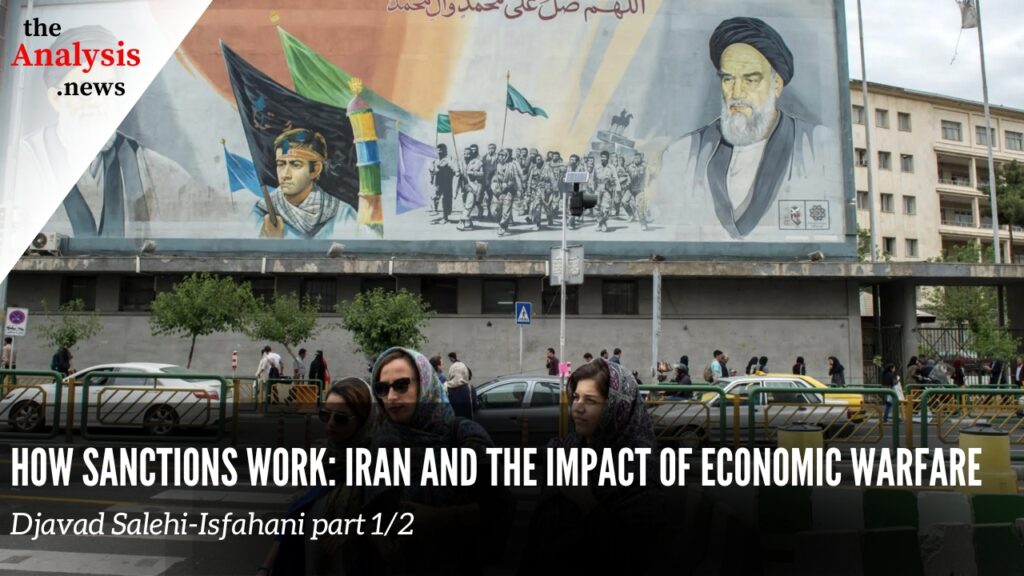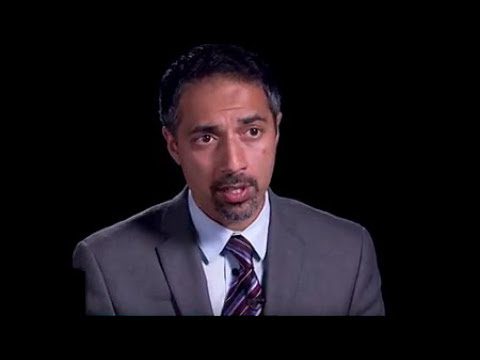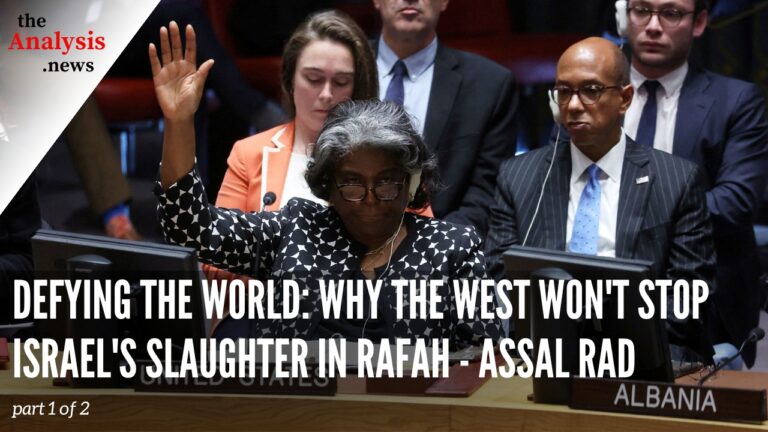In part two, historian and genocide scholar Omer Bartov discusses Israeli Prime Minister Benjamin Netanyahu’s decisions to prolong the plight of the Israeli hostages and the slaughter of Palestinians in Gaza in order to remain in power. Bartov also derides the U.S. billionaires who pressured university presidents to break up pro-Palestine student encampments.
Israel’s Abu Ghraib – Omer Bartov part 1/2
Talia Baroncelli
You’re watching theAnalysis.news, and I’m your host, Talia Baroncelli. You’re watching part 2 of my discussion with genocide scholar and historian Omer Bartov.
If you’d like to support the show and help us out, you can go to our website, theAnalysis.news, and hit the donate button at the top right corner of the screen. Make sure you get onto our mailing list; that way, you’re always up to date every time we publish a new episode. Feel free to share the show with your friends and family, and like and subscribe on YouTube or other podcast streaming services such as Apple or Spotify. See you in a bit with Omer Bartov.
I’m very happy to be joined by Omer Bartov. He is a Samuel Pisar Professor of Holocaust and Genocide Studies at Brown University in the United States. He’s the author of numerous books, including Hitler’s Army, Germany’s War, and the Holocaust: Disputed Histories, as well as a book published last year, last August 2023, called Genocide, the Holocaust and Israel-Palestine: First-Person History in Times of Crisis. I’m very happy that you were able to join me today, Omer. It is great to have you back.
Omer Bartov
Thanks for having me.
Talia Baroncelli
I wanted to move to the rest of the Middle East now because it’s an incredibly volatile time. The top political leader of Hamas, Ismail Haniyeh, was assassinated in Tehran while he was visiting the newly inaugurated President Masoud Pezeshkian. After this killing, which Israel actually neither denied nor claimed responsibility for, but it’s pretty clear it was them, Yahya Sinwar has now been appointed political leader of Hamas. Do you think his appointment, given the fact that he was behind the October 7 attacks on Israel, does that give Netanyahu another excuse to stop negotiating and to say that it’s not possible for Israel to negotiate with the so-called mastermind of the October 7 attacks?
Omer Bartov
Look, Netanyahu, in truth, will always find an excuse. He’s smart enough to find an excuse. Now, he killed the main negotiator, as officials in Qatar said. It’s very hard to negotiate when you’re killing people you’re negotiating with. But Netanyahu will keep finding excuses not to negotiate with Hamas or to negotiate, but never to settle on anything. He keeps moving the goalpost all the time because he does not want to free the hostages. He does not want a ceasefire. It’s as simple as that. There’s no beating around the bush. He does not want it because he has to stay in power.
As far as he’s concerned, if he reaches any settlement with Hamas, then his extremist coalition partners, those people we’ve been talking about, [Bezalel] Smotrich and [Itamar] Ben-Gvir, threaten to resign. If they resign, his government is gone. Then finally, there will be, first of all, an investigation, which he does not want to have a state commission investigation of what happened on October 7. He will not have it as long as he’s Prime Minister. That’s absolutely certain. All the other charges that have been laid against him, including charges that have to do with Siemens, with the production of submarines, of bribery, and all kinds of bad stuff, he may well end up in jail. He does not need that.
Now, on the side of Hamas, indications are that Hamas wants a deal and that it is possible. The Americas have said that. The Egyptians have said that. The Saudis have said that. Qatar has said that. The Israeli military and the Israeli Secret Service, both the Internal Secret Service and the Mossad, they all say, right now is time to have a deal, not only because we want to free the hostages, but because it’s the right thing to do, to free whoever is left alive, at least to let them go, not only for the moral reason but also because this is not going anywhere.
Israel’s own strategic interests are to continue this fighting in Gaza, which is the main reason for the complete mess now in the north of Israel, the destruction of Northern Israel, and the destruction of Southern Lebanon. Entire areas have been burned down. Tens of thousands of people have left their homes. They have no jobs. They have no income. They have no homes. All of this is because of the fighting continuing in Gaza. Now, with the Houthis involved, with the Iranians involved, with the Shi’ite militias in Syria, all of this is because Netanyahu will not stop the war in Gaza.
The assassination of Haniyeh is just part of the story. What is, to me, I have to say astounding because I listen to the Israeli news every day on the main networks. It’s extraordinary how those who shape public opinion in Israel and people watch the news all the time, of course because they’re terrified. They want to know what’s going on and cannot talk about the larger strategic frame of what is going on. They can not accept that, in fact, all of everything that is happening now, right now, not the Hamas attack, although you can tie that, too, to Netanyahu’s policies, but everything that is happening now is simply because one man in power will not reach an agreement, will not free Israeli hostages, and will not stop the fight in Gaza.
In the entire region, right now, tens of thousands, hundreds of thousands of people suffering from death, and many more may suffer at any moment, is because this one man will not reach that agreement. That is absolutely extraordinary.
Talia Baroncelli
Well, is there any discussion in Israeli media, though, of this leaked report? I think it was reported in Haaretz, an Israeli newspaper, by a U.S. official who said that Biden is incredibly frustrated with Netanyahu. He’s saying, stop bullshitting me about the hostages, essentially implying that there’s more that Netanyahu can do to reach a ceasefire and for the hostages to be released.
Omer Bartov
It’s been reported. Yes, it’s been reported. But look, the problem here is, had President Biden in November or December last year done the following: had he had said to Netanyahu, whom he has known for a long time but seems not to really understand, had he said to Netanyahu, look, you have to stop the war now. You have to reach an agreement and stop the war. If you don’t stop the war, you’re on your own. Fine. You are a head of state, and you can do whatever you like in your state, but you’re on your own. You will not get diplomatic cover from us, and you will not get arms from us. Had he said that the war would have ended.
Now, there would have been a very high domestic political price for Biden, not as high as he’s paying now, of course, but he didn’t know that. But there would have been a high political price. Had he done the statesman-like thing, we would not be in the situation we are in now. The entire region is on the verge of catastrophe because (A) obviously Netanyahu has conducted this policy, and (B) the United States has not put a stop to it, which it had in the past.
There are examples, of course, of the United States saying to Israel, stop. When it said so, clearly, Israel stopped. This time, Biden did not do that. The result is where we are now. So yes, this is reported in Israel. People have reported what Biden said, they chuckle, and they tried to translate it into polite Hebrew or not-so-polite Hebrew. But they know that Netanyahu couldn’t care less because there’s been no sanctions.
Talia Baroncelli
Well, there’s a well-known example of the U.S. saying, stop Israel. I think that was in the ’80s when Israel was involved in bombarding Lebanon. It was Reagan who… none of us were there in the room, of course, so this could be embellished. Reagan is reported to have said to Menachem Begin to essentially stop the airstrikes and the bombardment because it looks like a genocide or a Holocaust. I can’t remember the exact wording, but saying, you need to stop this now, and he did. I think that’s an example of the United States using its leverage.
Recently, Netanyahu was in the United States. He gave a speech in front of U.S. Congress. There were quite a few progressive Democrats who did not attend out of protest. It does seem like Kamala Harris has been trying to send a somewhat different message, at least based on her rhetoric, trying to acknowledge the suffering of the Palestinians. Do you think this particular attack on Haniyeh, as well as on the second in command of Hezbollah in Beirut, killing Fuad Shukr, is trying to impress upon Kamala Harris that she can’t change policy if she were to be elected President?
Omer Bartov
Look, I can’t, and I don’t want to get into Netanyahu’s head. It is not an environment I would like to live in. But my reading of it, and I’m not the only one, I’m not inventing anything here, is that Netanyahu is hoping very much that there will be a change in the administration. He’s hoping to have Trump as president. Whether it would be good for him or not, I don’t know, and I don’t think anybody knows. I don’t think even Trump knows that.
My sense is that for him, the way he sees it, if things get worse in the Middle East, that will lessen the chances of the Democrats to win the election. So, not that he’s trying to influence Kamala Harris, he is trying to influence the election in America.
Now, again, I don’t know if he’s right or wrong, and I don’t think that’s his main motivation, but I think it’s part of it. His main motivation is only one thing right now. That’s extraordinary because this has never happened in Israeli history. Israeli political leaders have acted at times, brutally, but never irrationally. This behavior right now is irrational.
I’ll remind you that there were many cases in which American presidents put their foot down. It started with [Dwight D.] Eisenhower after the 1956 war, when Eisenhower said to [David] Ben Gurion at the time, you have to get out of there. You have to get out of Sinai. Ben Gurion did. It happened with President Bush, the first, when his State Secretary told Prime Minister [Yitzhak] Shamir, he said, this is the phone number of the State Department. If you want to talk with us, call us. Otherwise, we’re out of this. This was around the Madrid Conference. They withdraw $10 billion from funding Israel. So, it has happened in the past.
We now are in a situation where, on the one hand, Israel has a Prime Minister who has a huge amount of power in Israel itself and is acting completely in his own self-interest, entirely against Israel’s own interests. We have a President in the United States who otherwise has, I think, done quite well in the international sphere but somehow has found it impossible to put his foot down on Israel. That is creating a situation of real danger of things, however bad they are right now, getting even worse.
Talia Baroncelli
I do want to speak about the protests that took place on college campuses in the United States as well as throughout Canada and Europe. When Netanyahu was giving a speech before Congress, he did have some really horrible words for these protesters, saying that they were anti-Semitic and said some other things, comparing them to Nazi youth, I think, in the early ’30s, if I remember correctly. How would you characterize the protests? Speaking very generally, would you defend the right of college protesters to protest what the Israeli government is doing, or would you consider some of the statements that are being made anti-Semitic?
Omer Bartov
Well, first of all, everybody in politics these days, there’s a lot of projections. When Netanyahu says that about the students on American campuses behaving like Hitler youth or whatever, the people behaving like that right now are settlers on the West Bank, that’s where there is real violence, a real paramilitary, a fusion between settlers, paramilitaries, militias, the army, and the police, all together engaged in ethnic cleansing of the West Bank. That’s a projection.
As for the protest, first of all, of course, the students on American and European campuses have every right to protest, and I think they should protest. I was quite proud of the students that I knew who were protesting, and I went to a number of these encampments and sat with them and talked to them. Now, on the fringe of that, there were groups, and there were individuals who were using anti-Semitic slurs, which I think I would not want to have anything to do with them. This is not new. I encountered such things when I was a student at Oxford or in the United States many, many years ago. Antisemitism is alive and well. It exists, and Israel is certainly a trigger for antisemitism.
The vast majority of the students who were protesting were protesting, I think, for two main reasons. One, which I think is quite altruistic, they were protesting because they saw what was happening in Gaza, and they simply were appalled by it. They wanted to say this, we have to protest against that. You are killing thousands and thousands of women, of children, of old people, destroying an entire region; we want to protest against it. The second, which is, I’d say, from a point of view of interest, they understand that they, as American citizens and as taxpayers, are complicit in these events. If you are a citizen of a country that is supporting another country in these kinds of actions, then if you don’t protest it, if you don’t come out against it, then you are part of it. You are yourself complicit.
I think these protests were totally legitimate, and I think that the attacks on them, and that was in the United States, not in Europe. In Europe, they were actually more effective in terms of universities, with quite a number of universities pulling out of investments in Israel. In the U.S., they were much less effective. But the attacks on them, sending the police against them, besmirching them as anti-Semitic, and so forth, reflected something much deeper in American society. They reflected the fact that many universities are heavily dependent on donors who have their own interests and who are under the façade of supporting liberal institutions where they support diversity and difference of opinion and so forth, racial diversity, ethnic diversity, gender diversity, everything. Under that, there were donors who went to university administrations, as is well documented, and told presidents, you have to now send in the police and get rid of those protesters. If you don’t, then you’ll be out of a job. Those same donors are also sitting on all these boards and corporations of the university that appoint and fire university presidents. University presidents, not all of them, but many of them, want to keep their very well-paid jobs, so they sent in the police.
The interesting thing is that the only place where there was real massive violence, which was not police violence, was at UCLA. At UCLA, the violence was not by the protesters but by a bunch of hooligans who came from around the campus and attacked those students, with the police standing by and doing nothing until the next day they came, and then they broke up the encampment.
Yes, I think this was a good moment. I’m afraid things may happen again in the fall. I hope that universities will remember that they are precisely the sites where difference of opinion needs to be and must be expressed and not suppressed by bringing in the police.
Talia Baroncelli
Well, the majority of the protests on U.S. campuses as well as on university campuses in Europe had a very concrete demand, and that was divestment. I think in the United States, the endowments are so much larger at these universities. I think the protester’s demands for divestment was probably less successful there than it was in Europe.
I wanted to ask you about a very specific case in Berlin Germany, and that was at Humboldt University in Berlin. The protestors there had an encampment as well as an occupation of a specific university building. There were talks going on between the protesters and professors at the university and the head of the university, Julia von Blumenthal. These were good-faith negotiations that were proceeding. It seemed like they were making progress. It was actually the mayor of Berlin, Kai Wegner, who then called in the police to ensure that the protesters were forcibly displaced from the building and that the encampment was broken up.
I’m just wondering, these sorts of statements by Kai Wegner calling all the students anti-Israel or saying that they’re hateful towards Jews, saying that they’re anti-Semitic, does this create actual antisemitism or play into antisemitism?
Omer Bartov
Well, I’m afraid I can’t say much about what happened in Berlin. I don’t exactly know what happened there. What I can say is that, unfortunately, in the United States, many of the identifiable donors, meaning donors who identified themselves as putting pressure on universities to break up encampments, to shut students up, happen to be Jewish billionaires who don’t represent at all the Jewish community in the United States, but claim to represent it. Their actions will play into this. They claim to be fighting against antisemitism, which is not the main feature of these protests at all, but their actions will play into an anti-Semitic argument in the United States that Jews are in control of higher education, of the administration, of all the strings of power and money in the country and so forth.
Those donors who are drunk on their own power, I’m afraid, may actually certainly, if we end up having a Trump administration, will end up bringing out more and more antisemitism couched in the argument of anti-antisemitism. People such as Representative [Elise] Stefanik and so forth, people whose own roots are in prejudice and bigotry and antisemitism who claim to be fighting it and at the right moment, for them, will switch around and turn against the Jewish community in the United States.
Talia Baroncelli
Omer Bartov, Professor of Holocaust and Genocide Studies at Brown University, it’s been really great speaking to you again. I hope we can have your insights on this show very soon. Thanks for joining us.
Omer Bartov
Okay. Thank you.
Talia Baroncelli
Thank you for watching theAnalysis.news. If you’d like to support us, please go to our website, theAnalysis.news, and catch us next time.
Podcast: Play in new window | Download | Embed
Subscribe Apple Podcasts | Spotify | Android | iHeartRadio | Blubrry | TuneIn | Deezer | RSS
Never miss another story
Subscribe to theAnalysis.news – Newsletter
Omer Bartov is an Israeli-American historian. He is the Samuel Pisar Professor of Holocaust and Genocide Studies at Brown University, where he has taught since 2000. Bartov is a historian of the Holocaust and is considered one of the world’s leading authorities on genocide.

